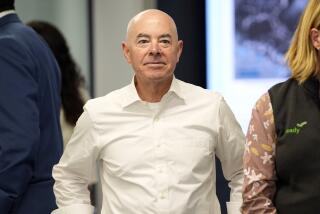U.S. Decision Against Group Pleases China
- Share via
BEIJING — In a political victory for China’s Communist regime, the United States has declared that it will freeze the financial assets of a shadowy Islamic group reputedly dedicated to promoting independence for the northwestern Chinese region of Xinjiang.
U.S. Deputy Secretary of State Richard L. Armitage, on a two-day visit here, said Monday that the Bush administration now considers the so-called East Turkestan Islamic Movement a terrorist organization because it carries out attacks on civilians. China accuses the group of waging a violent separatist campaign in Xinjiang, home to a Turkic-speaking people known as the Uighurs, most of whom are Muslim.
Armitage’s announcement came as a surprise because several months ago, Washington explicitly refused to draw a link between its war on terrorism and Beijing’s attempt to crush separatist sentiment in the region, a large territory rich in natural resources.
In Washington, State Department spokesman Richard Boucher said that although the U.S. would freeze the assets of the East Turkestan Islamic Movement, a decision had not been made on whether to officially designate it a terrorist organization.
Neither Boucher nor Armitage explained what information had prompted the change in the administration’s thinking.
Other sources said the administration reportedly has gathered evidence from Uighurs captured in Afghanistan that validates the Chinese assertion that the movement has connections to the Al Qaeda terrorist network and has committed terrorist acts inside and outside China.
These sources said a decision to place the group on America’s official “terrorist list” will be forthcoming, perhaps as early as this week.
There are reports that the U.S. has perhaps half a dozen Uighur suspects in custody at its naval base in Guantanamo Bay, Cuba, and that the Chinese government has been seeking to interrogate them. A senior U.S. official acknowledged hearing “something about” Uighurs being held at Guantanamo but declined to comment.
Since the Sept. 11 attacks on the U.S., the Chinese government has sought to use the global effort against terrorism as a reason for its crackdown in Xinjiang.
The human rights group Amnesty International said in March that Chinese security forces had closed mosques, detained suspected “splittists” and muzzled the local media to discourage unrest among Uighurs.
That same month, the State Department criticized Beijing for human rights abuses against political dissidents in Xinjiang.
But Armitage said Monday that “after careful study, we judged that [the East Turkestan Islamic Movement] was a terrorist group.”
Few people had heard of the group until the Chinese government identified it in January as a militant Islamic force that was bent on prying Xinjiang from China and setting up an independent republic.
In a detailed report, Beijing accused the group of working with Osama bin Laden, who allegedly pledged a “fabulous sum” of money for Muslim extremists to train and arm themselves for a low-level campaign of violence in Xinjiang.
The report accused the separatists of being responsible for 162 deaths by bombing, arson and poisoning from 1990 to 2001.
Larry M. Wortzel, a former U.S. military attache in Beijing who is now head of the Asian studies center at the Heritage Foundation think tank in Washington, said the organization is “pretty terroristic. They engaged in murder, terror and explosions.
“They have ... regularly gone out and beheaded people they didn’t like, particularly Han Chinese, and whole families of people,” he said.
Beijing has said that “double standards” have kept the U.S. from recognizing the fight in Xinjiang as a battle against terrorism.
Armitage said he stressed “the absolute necessity to respect minority rights,” in particular the Uighurs’, in his talks with China’s top leaders Monday.
President Bush, in a speech last year in Shanghai, said the war on terrorism should not be used as an excuse to persecute minorities, and added, “We must respect legitimate political aspirations and at the same time oppose all who spread terror in the name of politics or religion.”
But human rights groups fear that China’s Communist government--with Washington apparently on its side, in however limited a form--will now feel free to be even more aggressive in its clampdown.
Officials with Human Rights Watch in Washington said they had also heard, but could not confirm, reports of Uighur suspects’ being held at Guantanamo Bay. However, the rights group said any Uighur suspects held there should not be extradited to China because they would be unlikely to get a fair trial and could be subject to torture or execution.
Monday’s move was based on an executive order signed by Bush after Sept. 11 that allows the U.S. to track down and freeze assets of suspect groups. Armitage expressed hope that Washington’s decision would have “some effect on helping to dry up some of the funds” of the East Turkestan Islamic Movement.
It was unclear whether the move was connected with China’s announcement of long-awaited regulations tightening control over the export of missile-related technology.
Although the new rules were announced Sunday, they were officially approved several days ago.
Armitage welcomed the new export regulations. Whether they will lead to a lifting of the ban on U.S. commercial satellite launches on Chinese rockets, which Beijing has lobbied for, will be worked out in later negotiations, Armitage said.
He and his Chinese hosts also discussed Iraq, a country that poses a continuing threat to the U.S. and Iraq’s neighbors, Armitage told the Chinese. The Iraqi foreign minister, Naji Sabri, arrived in China on Monday for a visit, but Armitage said the timing was coincidental.
Armitage described the primary focus of his trip to Beijing, which ends today, as preparing for an upcoming summit--the third--between Bush and Chinese President Jiang Zemin, to be held in Texas in October.
Chu reported from Beijing and Efron from Washington.
More to Read
Sign up for Essential California
The most important California stories and recommendations in your inbox every morning.
You may occasionally receive promotional content from the Los Angeles Times.














